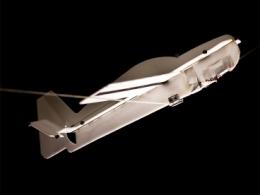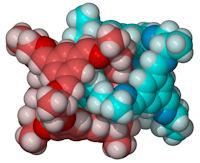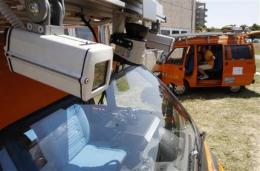Data sorting world record falls: Computer scientists break terabyte sort barrier in 60 seconds (31/07/2010)
 To break the terabyte barrier for the Indy Minute Sort, the
To break the terabyte barrier for the Indy Minute Sort, the
Smartphones tempting new targets for hackers (30/07/2010)
 A shopper looks at a smartphone at a shop in
A shopper looks at a smartphone at a shop in
A Flu Vaccine without the Needle (26/07/2010)
 A new technology delivers a vaccine in a painless, biodegradable skin patch.
A new technology delivers a vaccine in a painless, biodegradable skin patch.
Getting vaccinated for the flu or other infections could become as easy as pressing a patch onto the skin--no shot in the arm required.
Researchers have investigated other microneedle patches as a way to deliver drugs...
A plane that lands like a bird (21/07/2010)
 MIT researchers from the Computer Science and Artificial Intelligence Laboratory have developed a control system that lets a foam glider land on a perch like a pet parakeet. Photo: Jason Dorfman/CSAIL
MIT researchers from the Computer Science and Artificial Intelligence Laboratory have developed a control system that lets a foam glider land on a perch like a pet parakeet. Photo: Jason Dorfman/CSAIL
Liverpool scientists construct molecular 'knots' (21/07/2010)
 The molecular `knots' have dimensions of around two nanometers
The molecular `knots' have dimensions of around two nanometers
Scientists at the
Italy to China in driverless vehicles (21/07/2010)
In  this Thursday, July 15, 2010 video cameras are seen on the front of an unmanned electric-powered vehicle as a technician works on another similar vehicle in
this Thursday, July 15, 2010 video cameras are seen on the front of an unmanned electric-powered vehicle as a technician works on another similar vehicle in
Playboy launches new work-safe website (21/07/2010)
 In this photo taken July 15, 2010, Matt Gibbs, lead producer for Playboy Enterprises new web site called thesmokingjacket.com, is seen at Playboy's headquarters in
In this photo taken July 15, 2010, Matt Gibbs, lead producer for Playboy Enterprises new web site called thesmokingjacket.com, is seen at Playboy's headquarters in
Amphibians wiped out before they are discovered (20/07/2010)
 Fungal disease drives the loss of 30 species in
Fungal disease drives the loss of 30 species in
A Panamanian park has lost around 40% of its amphibian species in the past decade, with some dying out before biologists had even learned of their existence, according to research published today in the Proceedings of the National Academies of Science
"We're losing things before we find them," says Andrew Crawford, an evolutionary geneticist at the University of the Andes in
The disease chytridiomycosis, caused by the chytrid fungal pathogen Batrachochytrium dendrobatidis, threatens more than 2,800 amphibian species worldwide. Amphibians infected by the disease have skin several times thicker than normal, which affects their ability to breathe and the transfer of electrolytes.
More Than Half the World's Population Gets Insufficient Vitamin D, Says Biochemist (20/07/2010)
 Vitamin D surfaces as a news topic every few months. How much daily vitamin D should a person get? Is it possible to have too much of it? Is exposure to the sun, which is the body's natural way of producing vitamin D, the best option? Or do supplements suffice?
Vitamin D surfaces as a news topic every few months. How much daily vitamin D should a person get? Is it possible to have too much of it? Is exposure to the sun, which is the body's natural way of producing vitamin D, the best option? Or do supplements suffice?
Apes and Old World monkeys may have split later than thought (15/07/2010)
Fossil find resets timing of major event in primate evolution A slope-faced, big-toothed creature from the distant past has inspired scientists to recalibrate the ancient evolutionary split between apes and  Evolutionary findNewly discovered pieces of an ancient primate skull, including a face and frontal braincase shown here from the front and side, suggest to scientists that
Evolutionary findNewly discovered pieces of an ancient primate skull, including a face and frontal braincase shown here from the front and side, suggest to scientists that









